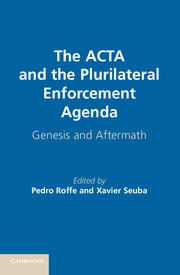Book contents
- Frontmatter
- Contents
- List of Contributors
- Foreword
- Acknowledgments
- Acronyms
- Introduction
- PART I THE FINAL ACT: ITS MAIN FEATURES AND CONTENTS
- PART II DOMESTIC LEGISLATIVE CHALLENGES
- 9 ACTA’s Constitutional Problem in the United States
- 10 Trick or Treaty?
- 11 A Brazilian Perspective
- 12 Lessons to Be Drawn from the ACTA Process
- PART III IMPACT ON RELATED PROCESSES
- PART IV VIEWS FROM STAKEHOLDERS: LESSONS
- PART V WHAT LIES AHEAD ACTA
- Annex I Anti-Counterfeiting Trade Agreement
- References
- Index
- References
10 - Trick or Treaty?
The Australian Debate over the Anti-Counterfeiting Trade Agreement
Published online by Cambridge University Press: 05 December 2014
- Frontmatter
- Contents
- List of Contributors
- Foreword
- Acknowledgments
- Acronyms
- Introduction
- PART I THE FINAL ACT: ITS MAIN FEATURES AND CONTENTS
- PART II DOMESTIC LEGISLATIVE CHALLENGES
- 9 ACTA’s Constitutional Problem in the United States
- 10 Trick or Treaty?
- 11 A Brazilian Perspective
- 12 Lessons to Be Drawn from the ACTA Process
- PART III IMPACT ON RELATED PROCESSES
- PART IV VIEWS FROM STAKEHOLDERS: LESSONS
- PART V WHAT LIES AHEAD ACTA
- Annex I Anti-Counterfeiting Trade Agreement
- References
- Index
- References
Summary
Introduction
The secretive 2011 Anti-Counterfeiting Trade Agreement – known in short by the catchy acronym, ACTA – is a controversial trade pact designed to provide for stronger enforcement of intellectual property rights. The preamble to the treaty reads like pulp fiction – it raises moral panics about piracy, counterfeiting, organised crime, and border security. The agreement contains provisions on civil remedies and criminal offences, copyright law and trademark law, the regulation of the digital environment, and border measures. Memorably, Susan Sell called the international treaty “a TRIPS Double-Plus Agreement” because its obligations far exceed those of the World Trade Organization’s TRIPS Agreement 1994, and TRIPS-Plus Agreements, such as the Australia-United States Free Trade Agreement 2004. The ACTA lacks the language of other international intellectual property agreements, which emphasise the need to balance the protection of intellectual property owners with the wider public interest in access to medicines, human development, and transfer of knowledge and technology.
In Australia, there was much controversy both about the form and the substance of ACTA.
The Department of Foreign Affairs and Trade was a partisan supporter of ACTA. Nonetheless, there was criticism from a wide range of stakeholders about the treaty. After holding hearings and taking note of the position of the European Parliament and the controversy in the United States, the Joint Standing Committee on Treaties in the Australian Parliament recommended the deferral of ratii cation of ACTA. This was striking – as representatives of all the main parties agreed on the recommendation.
- Type
- Chapter
- Information
- The ACTA and the Plurilateral Enforcement AgendaGenesis and Aftermath, pp. 169 - 201Publisher: Cambridge University PressPrint publication year: 2014
References
- 1
- Cited by



